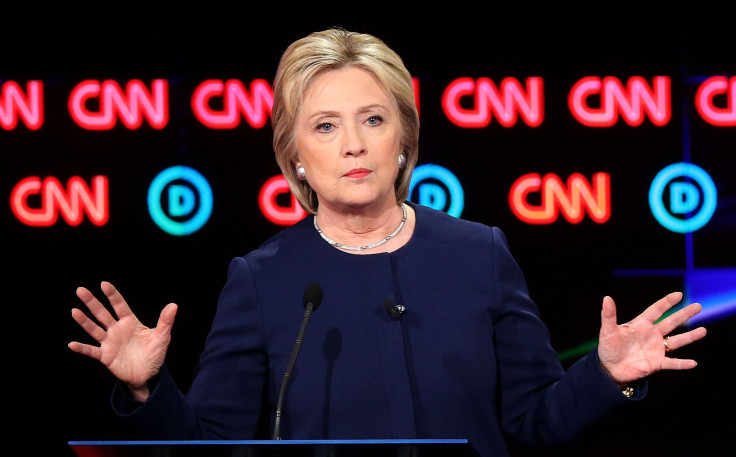At Flint Debate, Hillary Clinton Says Black Voters Should Trust Her On Criminal Justice

Former Secretary of State Hillary Clinton was twice asked about her record on U.S. criminal justice reform legislation in the 1990s, during Sunday's Democratic presidential debate hosted by CNN in Flint, Michigan. Co-moderator Don Lemon asked whether African-Americans should trust Clinton on those issues, given her support for the 1994 crime bill that contributed to the disproportionate mass incarceration of black males.
Clinton, who was recently challenged by a Black Lives Matter protester over her use of racially coded language to describe the nation's crime problem, said both she and her husband are on record for saying the legislation was a mistake.
"Back then there was an outcry over the rising crime rate," Clinton said. "Now, my husband said at the NAACP last summer that it solved some problems, but it created other problems, and I agree."
She added: "And, that's why the very first speech that I gave in this campaign was about criminal justice reform, and ending the era of mass incarceration, because I believe absolutely that too many families were broken up, too many communities were adversely affected. So, we've got to do a bunch of things."
When Lemon pressed her further, Clinton grew a bit defensive. "The question is why should black people trust you this time to get it right? That's the question," Lemon said.
Clinton replied: "Well, Sen. Sanders voted for [the crime bill] as well. Are you going to ask him the same question?"
Both Clinton and U.S. Sen. Bernie Sanders received a second question about their "racial blind spots" from Lemon.
“Being a white person in America, I know I’ve never had the experience that so many people in this audience have had,” Clinton said. "I have spent a lot of time with the mothers of African-American children who have lost them [in police encounters or vigilante cases]. I can’t pretend that I had the experience that you and others have had. I will do the best I can to empathize.”
Sanders offered a story about an African-American colleague being reluctant to hail a taxicab in Washington, D.C., because the drivers frequently passed him to pick up white fares instead. He also talked about his meeting with activists in the Black Lives Matter social justice movement, during which a young lady told him he didn't understand "what police do in black communities."
Later, Sanders said: "When you’re white you don’t know what it’s like to be living in a ghetto." It was unclear if he was implying that he thought only people of color lived in ghettos.
This was neither Clinton’s nor Sanders’ first visit to the largely poor, working-class and black city. Both candidates have held campaign events in Flint and addressed the city’s problems in various stump speeches to black voters throughout the country.
Flint, a city of nearly 100,000 residents located just an hour north of Detroit, once depended heavily on the American auto industry for jobs and other economic stimulus. But as Detroit declined when the auto industry fell on hard times financially so did Flint.
Michigan’s worst-hit communities saw jobs leave, schools closed or crumble from a lack of resources and homes abandoned in a foreclosure crisis. Many of those cities were assigned emergency managers, a state-appointed bureaucrat who stripped financial control from locally elected officials.
© Copyright IBTimes 2025. All rights reserved.






















